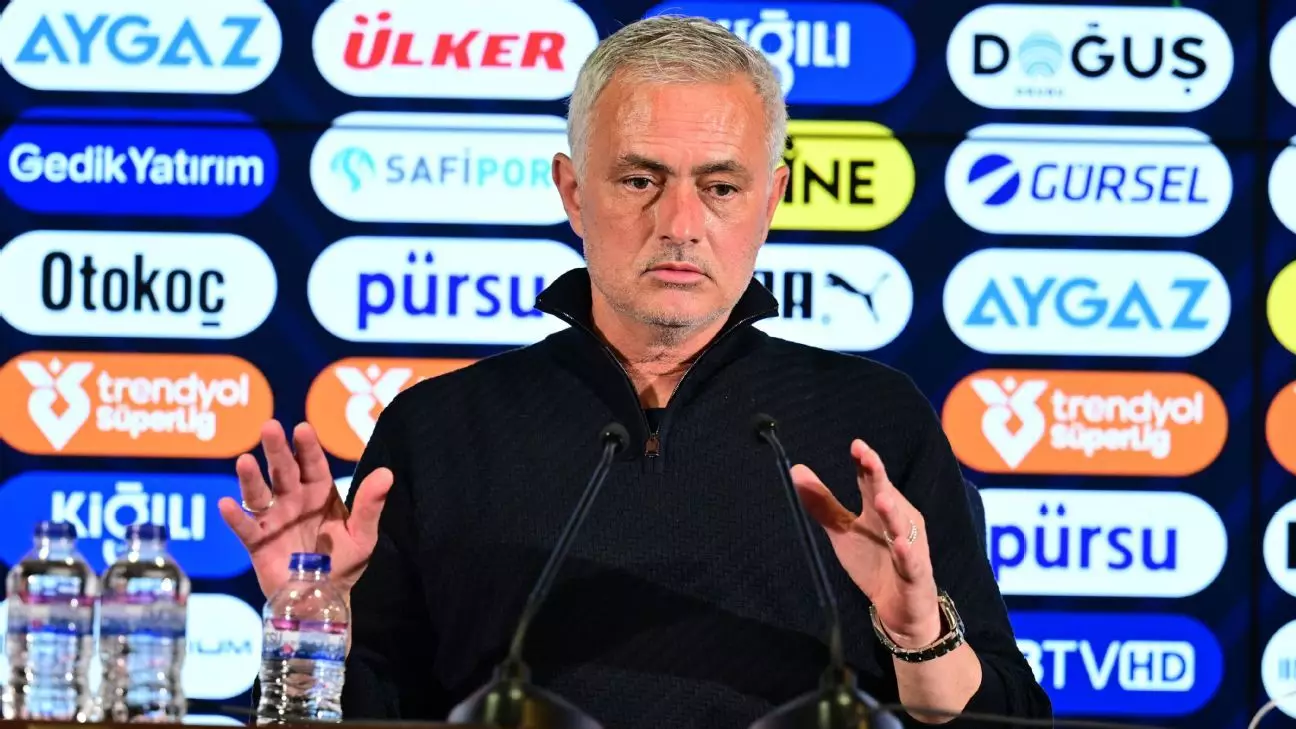Fenerbahce’s ambitious pursuit of a league title has hit a snag as they faced a disappointing 1-0 defeat to Besiktas, a result that left them languishing eight points behind their fierce rivals, Galatasaray, with only four matches remaining in the season. This home loss has cast a shadow over coach José Mourinho, who joined the ranks of Fenerbahce with grand aspirations to lead the team to its first Super Lig championship in a decade. The defeat sparked questions regarding his future at the club, yet Mourinho has chosen to remain coy about the prospects of his contract renewal, emphasizing the need for internal deliberation rather than public discourse.
Mourinho’s reluctance to address his future is not merely a tactical maneuver; it reflects a deeper complexity at the heart of professional football. In a sport where emotions run high and expectations soar, Mourinho’s withholding of information can be seen as an attempt to shield his players and staff from external pressures. His focus has undoubtedly been on constructing a resilient team capable of withstanding not just the physical demands of football, but also the mental battles that come with the relentless scrutiny of fans and media alike.
The Super Lig and its “Toxic” Environment
Mourinho has made headlines this season, describing the Super Lig as “toxic,” suggesting that the competitive landscape has been tainted by favoritism and bias against Fenerbahce. Such perceptions are not new in football, where the concept of refereeing favoritism often rears its head, but Mourinho’s passionate assertions lend credibility to a narrative that suggests his team is facing formidable odds off the pitch as well. In his post-match interviews, he tactically sidestepped direct confrontation with Galatasaray, instead reiterating that the struggle he faces involves contending with a “system” he believes is rigged to hinder progress for his club.
To position Mourinho’s comments within the broader context of competition is essential; they reveal an underlying frustration that may be shared among many coaches and players who feel victimized by external factors. Implicitly, Mourinho’s frustration also highlights a systemic issue that transcends mere sporting rivalry—it touches on fairness and the integrity of sport itself. The psychological impact this has on Fenerbahce’s players cannot be underestimated; competing against not just opponents, but also an inherent bias within the league, is a burden that weighs heavily on any team.
Navigating the Pressure of Fan Expectations
In the wake of the derby defeat, Mourinho’s acceptance of fan criticism encapsulates a key aspect of football culture: the unwavering expectations from supporters. It’s commonplace for fans to express dissatisfaction when results don’t align with aspirations. Mourinho’s acknowledgment of this reality demonstrates a level of self-awareness and respect for the emotions that drive the passion of Fenerbahce’s fanbase. While many might view this scrutiny as burdensome, Mourinho seems to embrace it as part of the football fabric that influences performance and passion on the pitch.
However, the reality remains grim for Fenerbahce as they face a season without victories against their arch-rivals, a statistic that feeds into the cycle of discontent among fans. The struggle to clinch a victory against major competitors is emblematic of deeper issues—both tactical and psychological. Mourinho’s challenge is to transform the narrative surrounding a season filled with missed opportunities and to invigorate a squad that in some ways feels chained by its history of disappointment.
Encouragement Amidst Challenges
On the other hand, Mourinho’s respect for fellow manager Ole Gunnar Solskjær serves as a reminder that camaraderie exists within the heavily scrutinized realm of coaching. His comments suggest a willingness to focus on personal growth rather than seeking to tear down others in similar positions of pressure. His perspective that both he and Solskjær must navigate the highs and lows of their respective journeys highlights an understanding that success often requires resilience and collective spirit.
While Mourinho might not be witnessing the results he desires immediately, his drive and fervor—traits synonymous with his coaching philosophy—could ultimately sow the seeds for a turnaround at Fenerbahce. The question remains whether this renowned tactician can cultivate that transition amidst the existing pressures, political entanglements, and emotional stakes that define the Super Lig.

